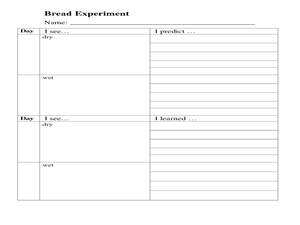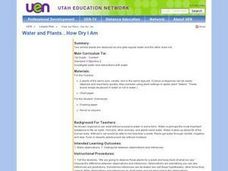Curated OER
Spider Safari
Today we are talking about one of the stealthiest, sneakiest, and most intriguing insects of all times, the spider. Learners will examine the predatory nature of these super bugs as they conduct a spider safari survey. Each child will...
University of Kentucky
The Great Spider Debate
Poor, misunderstood spiders! They are feared, disrespected, and detested by many people, yet they do so many positive things. A great addition to any insect unit, learn about some of the more common spiders, while hopefully dispelling...
Curated OER
Arthropods at Home: Spider, Isopod, or any Arthropod
Second graders observe, discuss, and record the requirements of a healthy environment for both arthropods and people by designing and maintaining an artificial habitat for an arthropod, and considering the requirements for a healthy body...
Curated OER
Beneficial Bug Scavenger Hunt
Students identify several beneficial insects and spiders, including predators and pollinators. They search an outdoor environment and record numbers and types of beneficial insects and spiders that they discover.
Curated OER
Solid Waste Recycling
Students seek scientific and technological solutions to envrionmental problems. They record class activities in a journal. They identify relationships among living things and their environments.
Desert Discoveries
Amazing Arthropods
Arthropods are the stars of a fine science lesson. Learners look at the diversity, characteristics, adaptations, and important roles that these insects play in the Sonoran Desert environment. A terrific document called "Amazing...
Curated OER
Night Creatures of the Kalahari
Students conduct an experiment to demonstrate how fruit fly populations are controlled by spiders. They observe a variety of environments with fruit flies and spiders and consider how vital spiders are to controlling the insect population.
Curated OER
How Do We Explore Strange Environments?
Students identify and label the different parts of a robot, rover, or a spacecraft. They discuss and record all of the features their robot will need to accomplish its mission and be able to explain why they chose these features to...
Curated OER
Create a Soil Aggregate
Students simulate the conditions which occur in a soil aggregate. They explain how IPM affects the environment. They identify the cast of characteristics to develop their aggregate.
Curated OER
The Parts of an Insect
Students examine various insects. They discuss the parts of an insect and the environments in which they live. Students explore the importance of insects to our environment. They draw an interpretation of their insect and label its parts.
Curated OER
Beneficial Bug Scavenger Hunt
Going on a scavenger hunt sounds like a great way to spice up any lesson plan. To better understand how beneficial insects are, the class goes outdoors to search for and observe a bug that has big benefits. Included in the lesson are...
Curated OER
Invent an Insect
Explore biology by researching adaptation. First, learners research and define a list of insect vocabulary terms and discuss the benefits of each insect characteristic. They then utilize a worksheet to create their own insect and share...
Curated OER
Animals, Soil, Trees
Fourth graders describe the various kinds of soils and how plants and animals are affected by them. They describe the baic needs of plants, scoring at least a 3 or 4 on a 4-point rubic. Students are able to predict and/or infer what...
Curated OER
Forest Decomposition
Students explore decomposition. Students define and describe components of the decomposition process. Students make a composter in a terrarium. Students record observations and changes weekly, drawing conclusions about the results of...
Curated OER
Investigating Animals in Soil
Students investigate and observe small animal activity on a plot of land on their school grounds. In small groups they identify the five kingdoms of animals, stake out a small plot of ground, collect samples, record and analyze any data...
Curated OER
Layers of the Forest- Leaf Litter
Students conduct an experiment. For this temperate forest lesson, students discuss what kind of animal life can be found in the forest. They read The Magic School Bus Meets the Rot Squad: A Book About Decomposition and complete an...
Curated OER
Meeting an Earthworm
Students inspect the anatomy of earthworms. In this earthworm lesson, students participate in a hands-on experiment as they analyze the structure of earthworms. Students demonstrate mastery through differentiated products. Lesson...
Curated OER
I Wish I Were a Butterfly
Students inquire about biology by reading a children's book in class. In this insect lesson, students read the story "I Wish I Were a Butterfly" and identify the unique characteristics of butterflies and other insects. Students complete...
Curated OER
The Web of Life - Ecosystem
Students examine the concepts of ecosystems and interdependence. They construct block pyramids to demonstrate interdependence, and map off an area to observe and identify animals. They create food chain mobiles and play a web of life game.
Curated OER
Interesting Insects
Students discover the characteristics of insects. They explore insects through cooperative learning, group projects, hands on activities, and poetry. They gain knowledge of insect life cycles, habitat, and physical characteristics.
Curated OER
Water and Plants...How Dry I Am
First graders observe two similar plants as one gets water and the other does not. They make predictions and chart the growth of each. They draw pictures of the plants after one week.
Curated OER
Investigating Animals in Water
Students observe small animal activity. They identify local water animals and describe the habitats where water animals can be found. Students collect samples to observe in the classroom.























